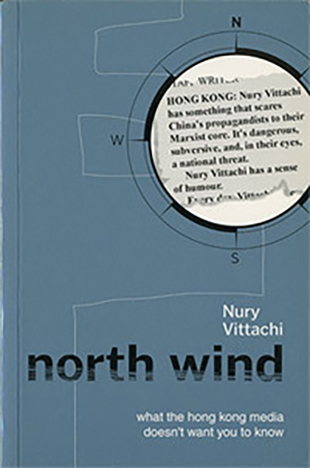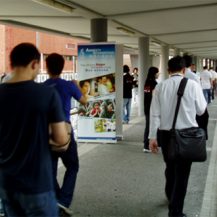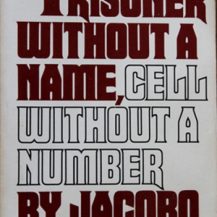On Nury Vittachi's 'North Wind'
Hong Kong writer Vittachi examines pressure on free speech during the 1997 handover from Britain to China
This text originally published: 15 July 2006

Nury Vittachi’s North Wind (Aberdeen, Hong Kong SAR, China: Chameleon Press, 2001) is a short, rambling tale of the period surrounding the 1997 handover of Hong Kong from Britain to China. Vittachi, whose family hails from Sri Lanka, is a local Hong Kong writer and entertainer who spent several years before the handover working as an associate editor for Hong Kong’s largest English-language newspaper, the South China Morning Post. Vittachi was particularly well known for his daily column, Lai See, which featured daily in the Business Post section and made satirical jabs at the political and business elites and various goings-on in Hong Kong.
But as the handover approached, Vittachi explains, top management and editorial figures at the SCMP began pressurizing writers to drop certain topics that were deemed “sensitive.” North Wind is Vittachi’s recollection of that pressure campaign, which led to his eventual resignation on the grounds that he was effectively being denied the free speech rights enshrined in the handover’s Basic Law and the 50-year policy freeze that was meant to ensure the maintenance of “One Country, Two Systems.”
The snappy book, which non-sequentially weaves a variety of amusing and alarming anecdotes into a coherent narrative, is quite illustrative of the uncertainties that characterized the end days of British rule in Hong Kong. It also provides a portrait of the Hong Kong press’s docility in the lead-up to and immediate aftermath of the handover, and hints at their gradual recovery of journalistic teeth. Throughout, Vittachi is careful to note that he is not anti-China, and that in many ways there was less pressure or censorship from the northern neighbor than there was self-censorship among the Hong Kong press establishment itself.
North Wind begins with Vittachi’s description of the handover ceremony, an overnight affair that stretched from 30 June to 1 July 1997. Vittachi is in handcuffs, but not because of any crackdown. Rather, he is partaking in a charity fundraiser that sees a number of Hong Kong luminaries handcuffed in pairs, partly in protest at the threat of a Communist clampdown. This sort of juxtaposition of readers’ preconceived expectations and actual events is a device that Vittachi repeatedly employs throughout the book.
The story quickly moves to Vittachi’s recounting of the SCMP’s 1995 dismissal of Larry Feign, the cartoonist behind the paper’s popular and polemical Lily Wong strip. Feign’s case drew condemnation from the international press, which saw his firing as blatant censorship and a harbinger of things to come with the handover only two years off. The SCMP defended Feign’s sacking on the grounds that Lily Wong was not popular with Chinese readers and was only liked by a handful of expatriates, and that Lily was too expensive to produce; the paper insisted that there was no political censorship involved. In characteristic style, Vittachi ruefully notes that, while the SCMP never published reader letters inquiring about Lily’s sudden disappearance, the paper’s new editor, Jonathan Fenby (fresh from The Guardian and The Observer), spent much time writing letters to foreign papers that had covered the Feign case in order to defend the SCMP position.
Vittachi asserts that Fenby went as far as to say that Lily was racist, and notes that overt critics of the SCMP were quick to label Feign (and Vittachi) anti-China—an accusation Vittachi deflects by noting his and Feign’s admiration of China and its people, and the trust they felt with China after having a problem-free time publishing a co-authored, quite political book in China.
It is at this point that Vittachi delivers his first sharp commentary on the particular situation of Hong Kong (and its press) in the pre-handover period: “The incident confirmed an idea that had been growing in my mind for some time. Hong Kong’s problems would not come from the mainland. They would come from Hong Kong.”1 The implication is that, less than any overt directives from Beijing being responsible for shifts toward the draconian in Hong Kong, particular elements within Hong Kong society would find ways to undermine the Hong Kongers’ long-established openness, almost out of a sense of expectation that the People’s Republic of China would welcome this behavior in its newly recovered territory. A corollary implication is that certain members of Hong Kong society (particularly the powerful pro-Beijing lobby) stood to benefit from cozying up to the top brass in China. These are subtle processes, and arguments that are difficult to substantiate, but easy enough to notice if one is watching for them.
As an example of the Hong Kongers’ own willingness to preemptively appease perceived mainland Chinese sensitivities, Vittachi offers an insider’s eye on the SCMP’s editorial process. He gives an example of a 1 June 1996 headline and strapline covering an important speech by a high-ranking official discussing press freedom in the post-handover years. The first version was prepared by the SCMP writers and mid-level editors, and the second was the version revised by the SCMP editor (Fenby, in this case).2
‘Will someone be allowed to write that there should be two Chinas? ... absolutely not’
Fears for press freedom as Lu lays down ground rules
‘They can criticise, they can object to our policies. They can say anything they like.’
Lu sets out ground-rules for press freedom after 1997
Each features a quote from Lu in the strapline, and a run-of-the-mill headline. The second version, still factually accurate but having lost the real point of the story, is what makes it into the SCMP newsprint. The world press’s coverage sticks to the original headline’s tack, Vittachi notes.
Later, Vittachi continues his exploration of this theme, relaying a speech he gave to the Society of Publishers in Asia just two months before the handover. In the talk, Vittachi debunks what he terms “the myths of publishing in Hong Kong”3 in a unique and nuanced discussion. Returning to the theme of Lu Ping’s speech, Vittachi lists the first of his five myths: “Hong Kong’s freedom of expression and freedom of speech is being destroyed by people from the north.” Vittachi argues that Lu Ping’s position that anything except attacks on top leaders would be allowed in Hong Kong’s press was a genuine pledge of free speech by the official, albeit one based on an Asian tradition of deference to rulers entirely fitting Chinese sentiments while not fully comprehensible to Western observers. Vittachi then claims that he is unaware of any “example of a Chinese official directly meddling in press freedom” in Hong Kong.4 Vittachi continues:
The problem is not from the north. In reality, our freedom of expression and freedom of speech is being destroyed by an enemy much closer. The enemy is within this room. The enemy is us: when we decide not to print something sensitive. Whenever a business person or politician tells me: Don’t mention this bit, because it is sensitive, then I know I am on the right track, and I only mention that bit. The voice of complicity is silence.5
There isn’t space in this report to present Vittachi’s entire argument, but he makes a compelling case for his position that Hong Kong’s media elites essentially caved—at least temporarily—to a perceived pressure from Beijing that wasn’t actually there, or certainly wasn’t as acute or as dire as pre-handover predictions had made it out to be.
Vittachi also elaborates, in a style that can be quite self-centered (but then, this is a personal memoir), on his and his frustrated colleagues’ attempts to obtain “The List” of sensitive topics that upper management (and powerful actors) did not want examined in the Hong Kong press. Ultimately, though, Vittachi decides that obtaining The List is not so important, even when he figures out how to conduct the research that would put the sensitive issues in stark relief. Instead, he opts to write North Wind, and tell the story of Hong Kong’s slippage into self-censorship from his own viewpoint. This is both a strength and a weakness of the book. Thus, while North Wind cannot be considered anything like empirical proof that Hong Kong’s media tacitly self-censored, the book does provide ample anecdotal and qualitative evidence from the privileged position of one of Hong Kong’s best known media players.
Notes
1 North Wind, pp. 39-40.
2 North Wind, pp. 52-53.
3 Vittachi’s speech is treated in North Wind, pp. 74-79
4 North Wind, p. 75
5 North Wind, pp. 75-76
North Wind
Nury Vittachi
Chameleon Press, 2001


